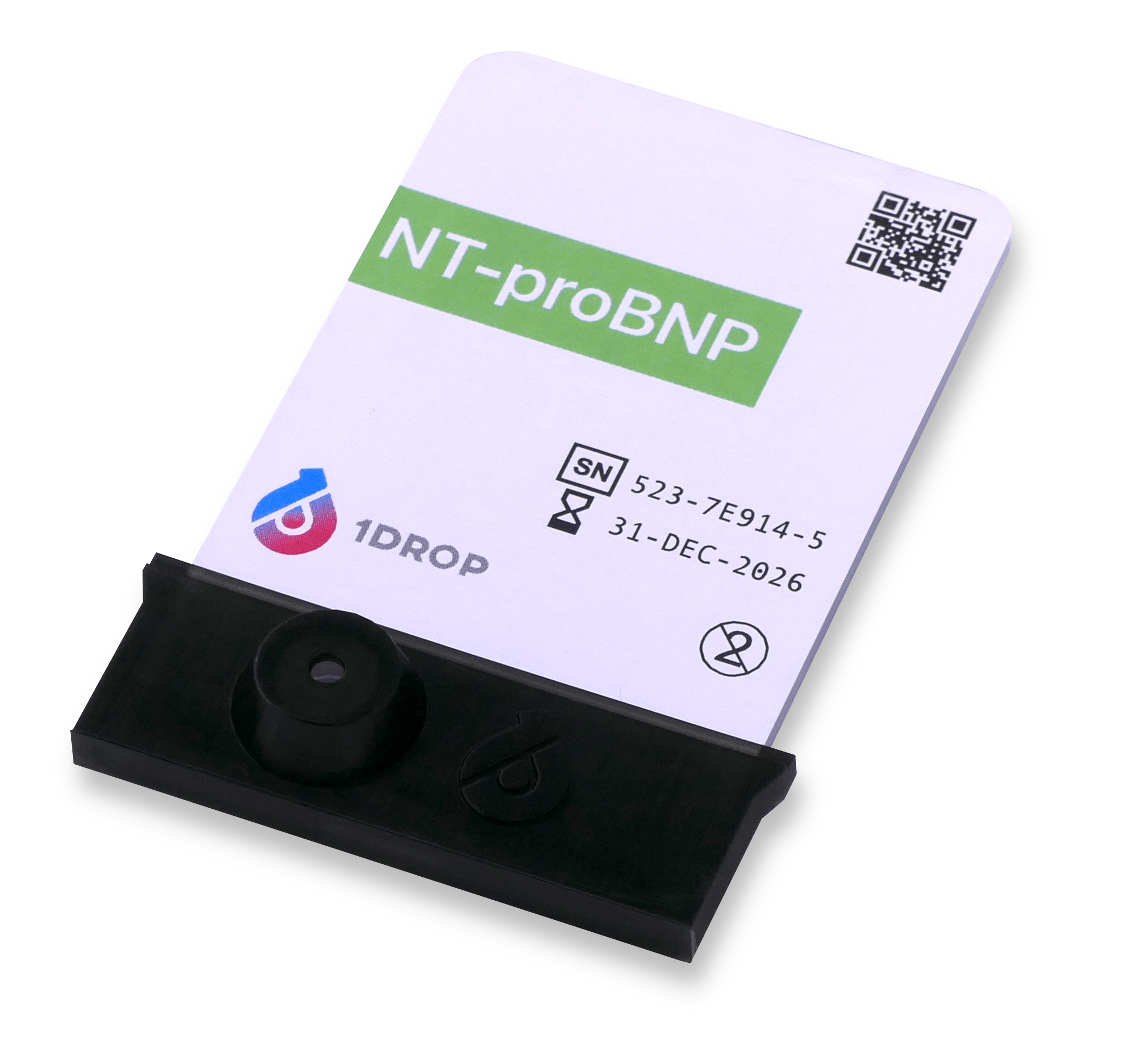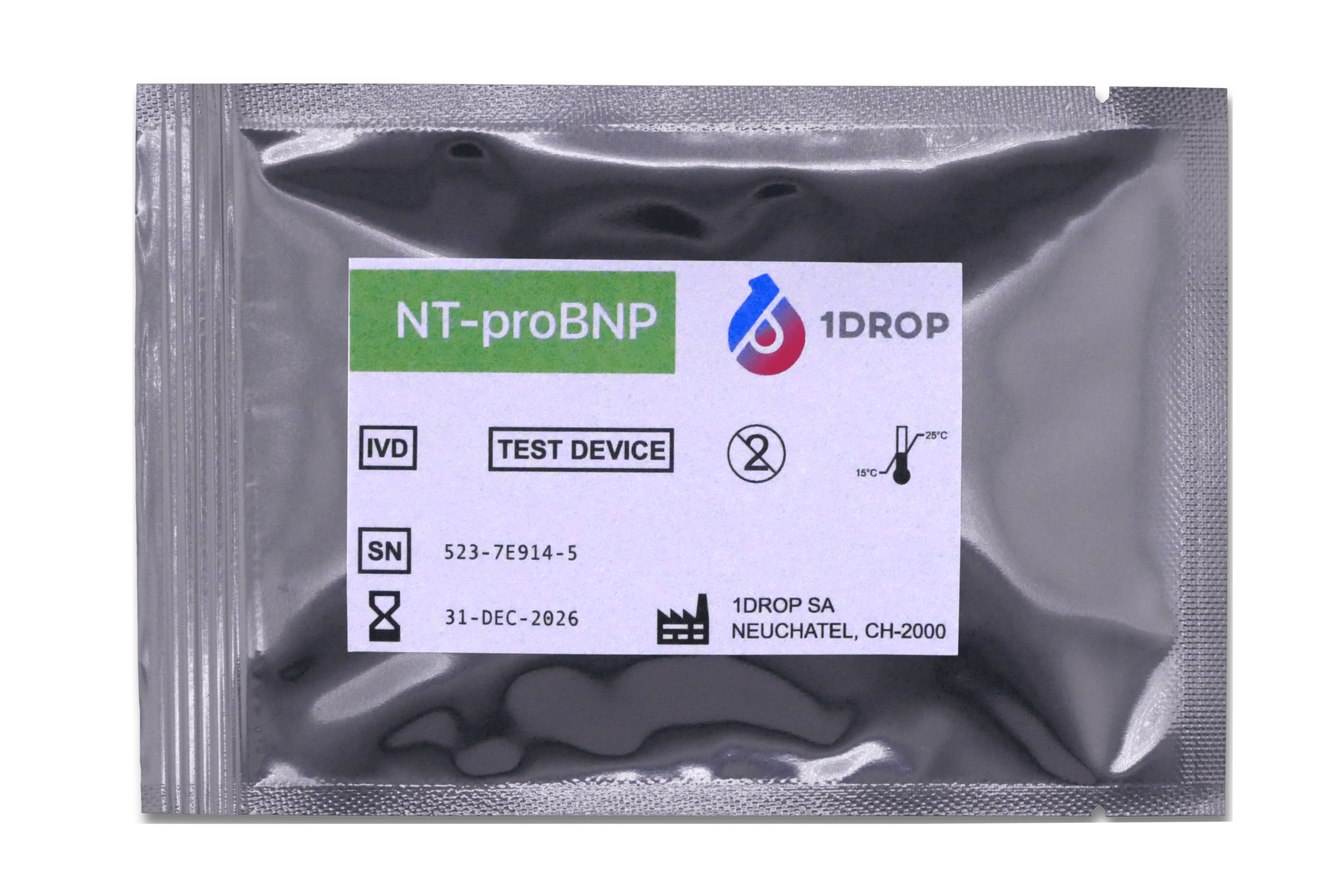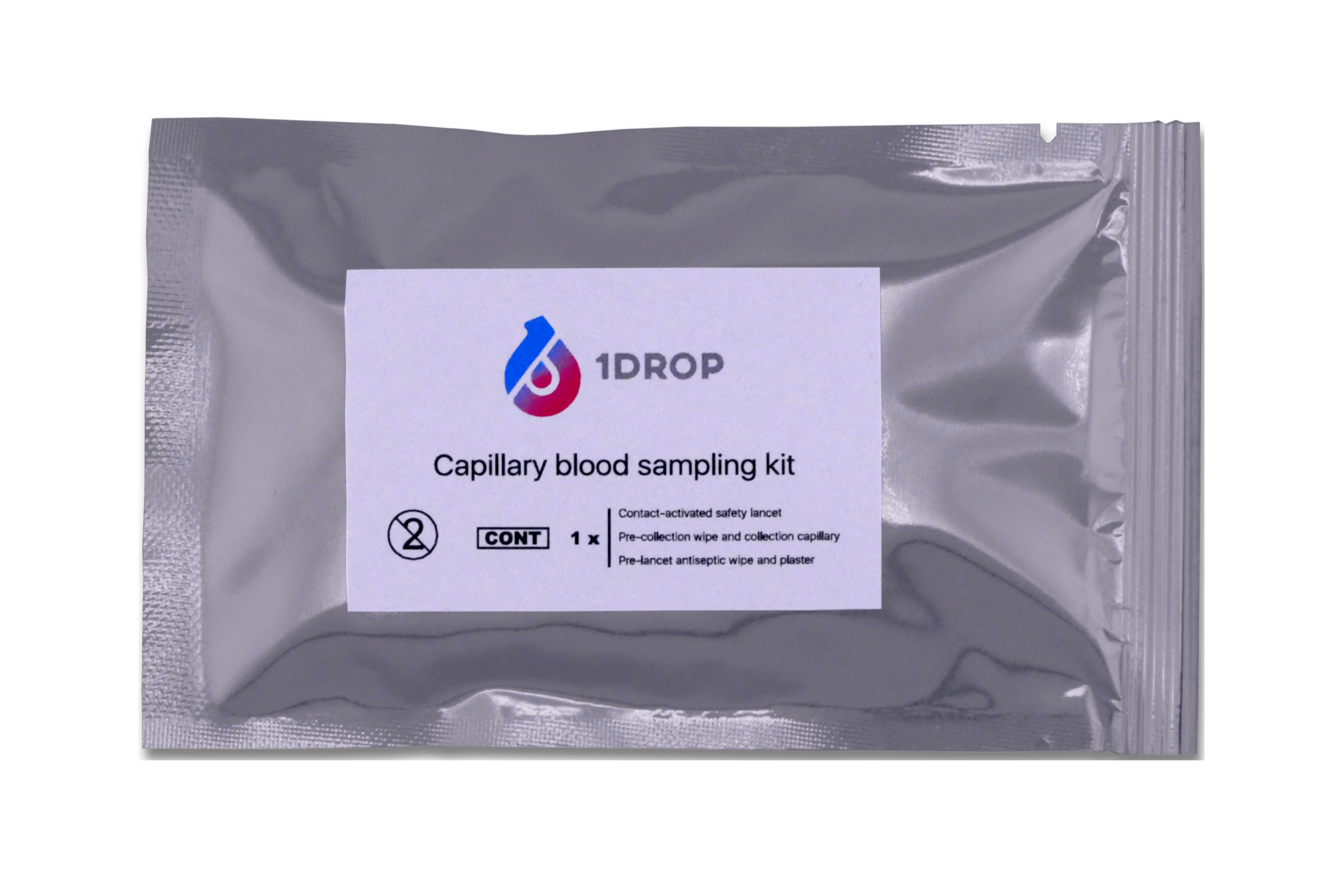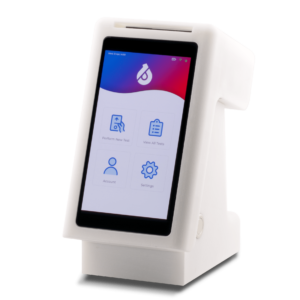NT-proBNP
CHF 79.00
The NT-proBNP test measures levels of a protein fragment released during heart stress or damage, particularly in heart failure. It aids in diagnosing and monitoring heart conditions, guiding treatments, and assessing cardiac health.
This is a pre-order product. We plan FDA 510(k) Clearance in North America and CE Mark in Europe in Q4 2024. We plan to start shipping in Q1 2025.
Capillary Blood Sample
Finger prick collection
Age 18+
15 minutes time to result
About the test
The N-terminal pro B-type natriuretic peptide (NT-proBNP) test is a pivotal diagnostic tool used in cardiology to evaluate cardiac health. This test focuses on measuring the levels of NT-proBNP, a specific protein fragment that is released when the heart muscles are under stress or sustain damage. This physiological response is particularly prominent in conditions like heart failure.
By quantifying NT-proBNP levels in the blood, clinicians gain valuable insights into a patient’s cardiovascular condition. Elevated NT-proBNP levels often signify cardiac strain, enabling accurate diagnosis, differentiation between various heart-related disorders, and effective monitoring of treatment efficacy.
The NT-proBNP test plays a crucial role in guiding treatment decisions and intervention strategies, allowing medical professionals to make informed choices that can significantly impact patient outcomes. This test serves as an indispensable biomarker, contributing to the comprehensive assessment of cardiac health and helping improve the overall management of cardiovascular conditions.
Who should take this test
The NT-proBNP test is recommended for individuals who are exhibiting symptoms or risk factors associated with heart-related conditions. This includes individuals experiencing symptoms such as shortness of breath, fatigue, swelling in the legs or abdomen, and persistent cough, which could indicate heart failure or other cardiac issues.
People with a history of heart disease, high blood pressure, diabetes, or other cardiovascular risk factors may also benefit from the NT-proBNP test to assess their cardiac health. Additionally, individuals who are undergoing treatment for heart conditions and need regular monitoring of their cardiac status can benefit from this test to gauge the effectiveness of interventions.
What’s tested
The test measures the levels of NT-proBNP in a person’s blood. NT-proBNP is a protein fragment that is released by the heart in response to increased pressure or stress on the heart muscles. Elevated levels of NT-proBNP in the blood can indicate various heart-related conditions, particularly heart failure.
The test helps healthcare providers assess the cardiac health of an individual by providing information about the strain or damage the heart might be experiencing. It is a valuable biomarker for diagnosing and monitoring heart failure and other cardiovascular disorders. The NT-proBNP test is used to differentiate between different causes of shortness of breath, assess the severity of heart failure, guide treatment decisions, and monitor the effectiveness of interventions.
Signs and Symptoms
This test help assess heart stress and damage including heart failure. If you are experiencing any of these symptoms, SEEK MEDICAL ASSISTANCE IMMEDIATELY:
- Shortness of Breath: Persistent or worsening shortness of breath, especially during physical activity or while lying down.
- Fatigue and Weakness: Feeling unusually tired or weak, even with minimal exertion.
- Swelling: Swelling in the legs, ankles, feet, or abdomen, known as edema, can be a sign of fluid retention due to heart failure or other cardiovascular conditions.
- Persistent Cough: A persistent cough, particularly one that produces white or pink-tinged mucus, might be linked to fluid buildup in the lungs.
- Rapid Heartbeat: Palpitations or a rapid and irregular heartbeat.
- Chest Discomfort: Discomfort or pressure in the chest could be related to heart issues including heart failure.
- Dizziness or Fainting: Feeling lightheaded, dizzy, or experiencing fainting spells might indicate reduced blood flow.
Risk Factors: Individuals with a history of heart disease, high blood pressure, diabetes, obesity, or a family history of cardiac conditions might benefit from NT-proBNP testing as a proactive measure to monitor their heart health.
Eligibility
The NT-proBNP Test is available for anyone over the age of 18 who wishes to measure heart stress and damage or monitor their heart health.
Before your Test
No special preparation is needed for this test. Fasting is not necessary.
After your Test
Your test results will be available in the 1DROP App and patient portal on the website, tablet or computer. You will receive a comprehensive and easy-to-understand report. You will be alerted if your results are outside the normal ranges.
Interpret the Results
Below 300 pg/mL 99% negative predictive value for excluding acute congestive heart failure (CHF).
Above 450 pg/mL consistent with CHF.
50-75 years of age:
Below 300 pg/mL 99% negative predictive value for excluding acute CHF.
Above 900 pg/mL consistent with CHF in the absence of renal failure.
Over 75 years of age:
Below 300 pg/mL 99% negative predictive value for excluding acute CHF.
Above 1800 pg/mL consistent with CHF in the absence of renal failure.
HOW IT WORKS
Order online test anywhere

Choose Your Tests
Shop for tests on the 1DROP website or App. Order your tests and they will be shipped to you.

Test Your Sample
Insert the Chip into the Reader. Collect a finger prick of blood and place it on the Chip. The 1DROP Reader analyzes your sample within 15 minutes.

View Your Results
View your test results on the secure and private patient portal on your smartphone, tablet or computer. Easily share your results with your doctor, family, friends. Obtain guidance on your next steps.
BENEFITS
Take control of your health
Easy, rapid, affordable home testing
Convenient and Fast
Easy to Use and Understand
Personalized
Reduce Preanalytical Error
Private & Secure
Actionable Health Information
QUESTIONS
1. What is the difference between BNP, pro-BNP and NT-proBNP?
BNP, pro-BNP, and NT-proBNP are all related cardiac biomarkers that provide insights into heart health, particularly heart failure, but they differ in terms of their structure, function, and clinical utility. One key difference lies in their half-lives, which impacts their detectability in the bloodstream. NT-proBNP, with its longer half-life, offers distinct advantages in clinical use.
B-type Natriuretic Peptide (BNP)
BNP is the biologically active hormone released by the heart in response to cardiac stress or strain, primarily by the ventricles. It has a relatively short half-life of about 20 minutes. BNP levels rise in situations of heart failure, leading to fluid retention regulation and vasodilation. Measurement of BNP can provide rapid information about acute cardiac events.
Pro-B-type Natriuretic Peptide (Pro-BNP)
Pro-BNP is the precursor protein that is cleaved to form both BNP and NT-proBNP. It has a short half-life similar to BNP, as it gets processed into these two fragments.
N-terminal pro-B-type Natriuretic Peptide (NT-proBNP)
NT-proBNP is an inactive fragment released when pro-BNP is cleaved. It has a significantly longer half-life compared to BNP, around 60-120 minutes. NT-proBNP remains detectable in the bloodstream for a longer period, offering a larger window for accurate testing. Its extended half-life makes it more suitable for diagnostic testing, as it can be reliably measured even after several hours or days from symptom onset. NT-proBNP levels rise in response to heart failure and other cardiac conditions, providing valuable diagnostic and prognostic information. Due to its stability, NT-proBNP is often the preferred biomarker for assessing heart failure, especially in situations where prompt testing might not be feasible.
2. What does an elevated NT-proBNP mean?
An elevated level of NT-proBNP typically signifies that the heart is experiencing stress, strain, or damage, particularly related to cardiac conditions. NT-proBNP is released by the heart muscles in response to increased pressure and stretching, which are common in conditions such as heart failure, where the heart’s pumping ability is compromised.
Generally, an elevated NT-proBNP level might indicate:
- Heart Failure: Elevated NT-proBNP is strongly associated with heart failure, both in diagnosing the condition and assessing its severity. In heart failure, the heart struggles to pump blood effectively, leading to fluid retention and elevated pressure in the heart chambers. This prompts the release of NT-proBNP.
- Cardiac Stress: Conditions that place stress on the heart, such as myocardial infarction (heart attack), valvular disorders, or cardiomyopathies, can also lead to increased NT-proBNP levels.
- Prognostic Information: The level of NT-proBNP can provide insight into the prognosis of certain cardiac conditions. Higher levels are often associated with worse outcomes and a greater risk of complications.
- Treatment Monitoring: Monitoring NT-proBNP levels over time can help healthcare providers assess the effectiveness of treatment interventions for heart failure and other cardiac issues. Decreasing levels might indicate that treatments are having a positive impact.
- Differentiation: Elevated NT-proBNP levels can help differentiate between cardiac causes and other conditions that might present with similar symptoms, such as shortness of breath.
3. What are the risk factors for heart failure?
Risk factors for heart failure are conditions, habits, or characteristics that increase the likelihood of developing this condition:
- Age: The risk of heart failure increases with age, especially in individuals over 65.
- High Blood Pressure (Hypertension): Chronic high blood pressure forces the heart to work harder, leading to weakening over time.
- Coronary Artery Disease (CAD): Blocked or narrowed arteries reduce blood supply to the heart muscle, potentially causing damage and weakening the heart.
- Diabetes: Uncontrolled diabetes can damage blood vessels and the heart muscle, raising the risk of heart failure.
- Obesity: Excess weight strains the heart, contributing to heart failure risk.
- Smoking: Smoking damages blood vessels, making heart failure more likely.
- High Cholesterol: High levels of cholesterol can lead to plaque buildup in arteries, increasing the risk of heart disease and heart failure.
- Family History: A family history of heart disease or heart failure can elevate your risk.
- Alcohol and Substance Abuse: Excessive alcohol consumption or drug abuse can damage the heart muscle.
- Sleep Apnea: This sleep disorder is linked to hypertension and heart failure.
- Valvular Heart Disease: Conditions like heart valve problems can lead to heart failure if not managed.
- Cardiomyopathy: This is a disease of the heart muscle that can weaken the heart and lead to heart failure.
- Previous Heart Attack: A heart attack can cause lasting damage to the heart muscle.
- Chronic Lung Disease: Conditions like chronic obstructive pulmonary disease (COPD) increase heart failure risk.
- Kidney Disease: Kidney problems can lead to fluid buildup and strain on the heart.
- Certain Medications: Some drugs can contribute to heart failure risk if not managed properly.
- Lack of Physical Activity: A sedentary lifestyle can contribute to obesity and other heart failure risk factors.
- Gender: Men are at higher risk of heart failure, though women’s risk increases after menopause.
Managing these risk factors through lifestyle changes and medical interventions can help lower the likelihood of developing heart failure and improve overall heart health.
4. If I have high levels of NT-proBNP, what should be my next steps?
If you have elevated NT-proBNP levels, it’s important to take the following steps:
- Consult a Healthcare Provider: Schedule an appointment with a cardiologist or your primary care physician for a comprehensive evaluation.
- Diagnostic Testing: Your healthcare provider may recommend additional tests such as echocardiograms, EKGs, stress tests, or imaging scans to assess your heart’s structure and function.
- Understand the Underlying Cause: Based on test results and your medical history, your healthcare provider will determine the underlying cause of the elevated NT-proBNP levels. This could include conditions like heart failure, coronary artery disease, or other cardiac issues.
- Treatment Plan: Your healthcare provider will create a tailored treatment plan. This may involve medications to manage blood pressure, reduce fluid retention, improve heart function, or address underlying conditions. Lifestyle changes such as dietary modifications, exercise, and stress reduction might also be recommended.
- Medication Management: If prescribed medications, take them as directed. Follow your healthcare provider’s guidance regarding dosage and timing.
- Lifestyle Modifications: Adopt heart-healthy habits such as consuming a balanced diet, exercising regularly, quitting smoking, managing stress, and limiting alcohol intake.
- Regular Follow-Up: Attend scheduled follow-up appointments to monitor your progress, adjust your treatment plan if needed, and assess the impact of interventions.
- Educate Yourself: Learn about your condition, its management, and the importance of adherence to treatment recommendations.
- Seek Support: Reach out to support groups, healthcare professionals, or counselors who can provide guidance and assistance as you manage your heart health.
Remember that elevated NT-proBNP levels are a signal of potential cardiac stress, and a thorough evaluation by a healthcare provider is crucial for accurate diagnosis and appropriate management. By taking proactive steps and working closely with your healthcare team, you can make informed decisions to improve your heart health and overall well-being.
5. How can I lower my NT-proBNP?
Lowering NT-proBNP levels involves addressing the underlying factors that contribute to cardiac stress or damage. Improving heart health can lead to reduced levels over time. Here are steps to consider:
- Follow Medical Recommendations: If you have a heart condition or heart failure, adhere to your healthcare provider’s prescribed medications and treatment plan. This can help manage symptoms and improve heart function.
- Manage Underlying Conditions: Control factors like high blood pressure, diabetes, and high cholesterol through medications, lifestyle changes, and regular monitoring.
- Adopt a Heart-Healthy Diet: Focus on a balanced diet rich in fruits, vegetables, whole grains, lean proteins, and healthy fats. Limit sodium and processed foods.
- Exercise Regularly: Engage in moderate exercise like walking, swimming, or cycling. Consult your doctor before starting a new exercise regimen.
- Maintain a Healthy Weight: Achieve and maintain a healthy weight to reduce strain on the heart.
- Limit Alcohol: If you consume alcohol, do so in moderation. Excessive alcohol can stress the heart.
- Quit Smoking: Smoking damages blood vessels and strains the heart. Quitting improves overall heart health.
- Manage Stress: Practice stress-reduction techniques like meditation, yoga, or deep breathing.
- Get Quality Sleep: Aim for 7-9 hours of quality sleep each night.
- Stay Hydrated: Drink enough water, consult your doctor about fluid restrictions.
- Take Medications as Prescribed: If prescribed medications, take them according to your healthcare provider’s instructions.
- Regular Follow-Up: Attend regular check-ups with your healthcare provider to monitor your heart health.
- Limit Caffeine and Stimulants: Excessive caffeine or stimulants can strain the heart.
6. What is cardiovascular disease (CVD)?
Cardiovascular disease (CVD) is the leading cause of death worldwide and includes all types of heart and blood vessel disorders, such as clogged arteries (coronary heart disease), heart attacks, heart failure, strokes, congenital heart defects, and peripheral artery disease.







